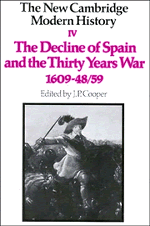Book contents
- Frontmatter
- INTRODUCTORY
- THE CENTRAL CONFLICTS
- THE UNMAKING AND REMAKING OF STATES
- Chapter XV The Spanish peninsula 1598–1648
- Chapter XVI French institutions and society 1610–61
- Chapter XVII The Habsburg lands 1618–57
- Chapter XVIII The fall of the Stuart monarchy
- CHAPTER XIX THE ENDING OF POLISH EXPANSION AND THE SURVIVAL OF RUSSIA
- THE FRONTIERS OF EUROPE
- References
Chapter XV - The Spanish peninsula 1598–1648
from THE UNMAKING AND REMAKING OF STATES
Published online by Cambridge University Press: 28 March 2008
- Frontmatter
- INTRODUCTORY
- THE CENTRAL CONFLICTS
- THE UNMAKING AND REMAKING OF STATES
- Chapter XV The Spanish peninsula 1598–1648
- Chapter XVI French institutions and society 1610–61
- Chapter XVII The Habsburg lands 1618–57
- Chapter XVIII The fall of the Stuart monarchy
- CHAPTER XIX THE ENDING OF POLISH EXPANSION AND THE SURVIVAL OF RUSSIA
- THE FRONTIERS OF EUROPE
- References
Summary
A Spain without Philip II was difficult to imagine. For forty years every sudden alteration in the affairs of Europe had somehow seemed connected with the man who sat alone at his desk in the Escurial, surrounded by mountains of paper. ‘When he goes’, a Spanish noble had remarked a year before his death, ‘we shall find ourselves on another stage, and all the characters in the play will be different.’ In the event, not only was the cast changed, but the play itself turned to tragedy. The king died on 13 September 1598, leaving an aimless son and an empty treasury. In 1596, for the third time in his reign, the crown had repudiated its debts to the bankers. Financial exhaustion made peace essential: peace with France in 1598 and with England in 1604. As Spain slowly abandoned its militant imperialism, and the glorious pageant of notable victories slipped quietly from the memory, the grim reality could no longer be ignored. The nation which, for the extent of its empire and the reputation of its arms, ranked as the greatest power in the world, was visibly in a state of ruin, and its ruin demanded explanation. At once came a spate of books, questioning, analysing, suggesting remedies. All were devoted to explaining the paradox of Spain: the paradox that it was poor because it was rich, that it had gold and silver in abundance and yet it had none.
- Type
- Chapter
- Information
- The New Cambridge Modern History , pp. 435 - 473Publisher: Cambridge University PressPrint publication year: 1970
References
- 1
- Cited by



